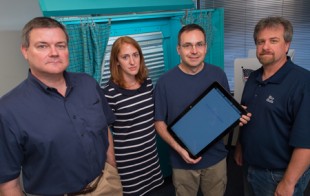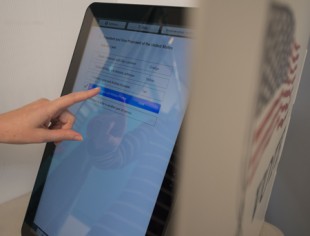Experts work with Travis County to design secure, easy-to-use, e-voting system
At the urging of county election officials in Austin, Texas, a group of Rice University engineers and social scientists has pulled together a team of U.S. experts to head off a little-known yet looming crisis facing elections officials nationwide.
According to a January report from the Presidential Commission on Election Administration, U.S. elections officials are facing an “impending crisis” as they look to replace the aging voting systems they purchased after Florida’s flawed 2000 election. The commission concluded that elections officials “do not have the money to purchase new machines, and legal and market constraints prevent the development of machines they would want even if they had the funds.”

Rice experts (from left) Phil Kortum, Claudia Ziegler Acemyan, Dan Wallach and Mike Byrne are working to design a new electronic voting system that is both secure and easy to use. Credit: Jeff Fitlow/Rice University
But a STAR (Secure, Transparent, Auditable and Reliable) voting system is on the horizon.
At the behest of Travis County Clerk Dana DeBeauvoir, Rice University experts in computer security, functional design and ergonomics are working with collaborators to design an unhackable voting system that will be cheaper than existing e-voting machines and just as easy for voters to use.
STAR team member Phil Kortum, assistant professor of psychology, said security and usability often conflict in technology. A good example would be a 16-character password with upper- and lowercase letters, numbers and capital letters. While ultrasecure, such a password has little utility if the user can’t remember it.
E-voting and computer security expert Dan Wallach, professor of computer science, has documented flaws in e-voting systems for more than a decade. He said working on STAR has been a real eye-opener for team members on both sides of the security-usability divide.
“Security people have always said, ‘We need to be involved early in the design, because it’s a lot easier to fix a security problem before you’ve built the thing,'” Wallach said. “It turns out that usability people have been saying the same thing all along.”

Rice University experts are helping design a new voting system that would make use of tablet computing technology to hold down costs and improve usability and security. Credit: Jeff Fitlow/Rice University
The quest to build STAR began three years ago when DeBeauvoir spoke at a voting technology conference and asked the academics at the conference to work with her office to create an e-voting system with security features that are lacking in today’s market. For example, most e-voting systems offer no method for conducting a meaningful recount because there are no physical records — like paper ballots — that can be tallied.
Wallach, a longtime advocate of paper ballot backups to e-voting systems, leaped at DeBeauvoir’s offer to help design a more secure e-voting alternative.
“I told her I needed a lot more help to make this work, and we gradually built up a group that included several people at Rice and a number of others from across the country,” Wallach said.
The team has met with DeBeauvoir and her staff several times to develop specifications that can be issued to a vendor to produce a STAR prototype. Wallach said the team hopes that the call for proposals will go out to vendors later this year, and it will likely take several years to refine and test prototypes. He and Kortum have landed a three-year $1.2 million NSF grant that will allow them to address a number of security and usability questions during those tests.
“Voting is too important to experiment with, so you need to work out all the kinks before you put anything into the polls during a real election,” Wallach said. “I’d like to think we will have something ready in time to be used in the midterm elections in 2018.”
It is unique for security and usability experts to work so closely on an e-voting system. STAR co-designer Mike Byrne, professor of psychology, said, “As far as we know, this is the first voting system where that has actually happened.”
But Wallach said the ultimate success or failure of the project could hinge on how much it costs. The team, which includes Rice postdoctoral researcher Claudia Ziegler Acemyan, is working hard to build the system around commercially available tablet computers, a move that could result in a system that is about half the price of commercially available e-voting systems.
“It doesn’t matter how good the system is if it costs too much,” Wallach said. “Our hope is to design something that’s both better and cheaper so that adoption becomes a no-brainer.”


A very nice presentation for the alumnae.
I can remember my father and mother (who worked elections) showing us how elections actually happened in Edinburg, Texas. That would have been ~1956.
Roger N. Tanner, PE
Rice: 1958 to 1963 for BA and BSME
~1969 Master of ME, working and going to school part time.
Now, I am suffering under the delightful “year around” weather on the Central Coast of CA